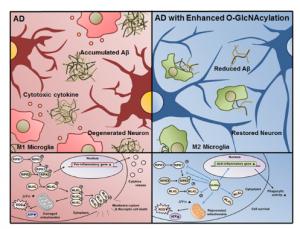[테크월드=조명의 기자]
Sungkyunkwan University’s Department of Pharmacy Professor Donggyu Cho’s research team presented a new study that can be applied to the prevention and treatment of Alzheimer’s dementia.

The research team has identified a new mechanism that suppresses neuronal cell death, amyloid accumulation, brain inflammation and cognitive impairment that occur in Alzheimer’s dementia through a protein modification called O-GlcNAcylation.
The brains of Alzheimer’s dementia patients have suppressed ogluneglycation compared to normal people. Therefore, the researchers noted that the degree of o-glune glycosylation and the progression of Alzheimer’s symptoms are related, and for the first time that restoring reduced o-glune glycosylation inhibits necroptosis of nerve cells and suppresses various symptoms of dementia. Proved.
As a mechanism for this, proteins related to neuronecrosis are activated in the brain of Alzheimer’s dementia patients and dementia animal models, and they are aggregated with each other to destroy cell membranes, causing neuronal cell death. As a result, it directly acts on a key protein called RIPK3 to inhibit the cell death program.
In addition, increased oglune glycosylation promotes the ability to remove amyloid-beta by microglia, which are brain immune cells, and effectively suppresses various dementia diseases such as brain inflammatory response, nitrification stress, and abnormal mitochondrial accumulation. Based on these evidences, the research team suggested that regulating oglunec glycosylation is a new target mechanism to overcome Alzheimer’s dementia.
Professor Dong-gyu Cho said, “Ogluneglycation is expected to be closely related to the progression of various degenerative brain diseases including Alzheimer’s dementia.” • We will be able to present a new direction to overcome degenerative brain diseases.”
The research results were published in the world-renowned journal’Science Advances’ on January 4th.
This research was conducted through joint research with the research team of the Korea Brain Research Institute, and was carried out with the support of the Ministry of Science, ICT and Communication, and the Korea Research Foundation’s Mid-sized Research Project and Leading Research Center Project (MRC).
Reporter of Lighting [email protected]
Copyright © Techworld News Unauthorized reproduction and redistribution prohibited
